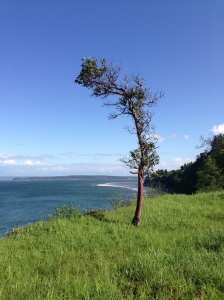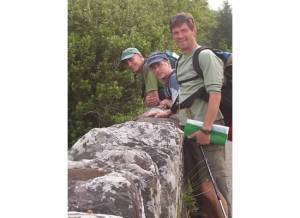What's said in the marriage, stays in the marriage. Mostly because age is kind and I can't remember the petty comments we've flung at each other over 21 years. The loving comments are said often enough they are ingrained in my heart. But there is something Brendan said to me long ago which I will share with you: "Julie, you're not happy unless you have something to worry about." This resonates still because, well, it's mostly true. I would cut the word "happy" - worrying doesn't make me happy. It makes me.
Let's rewrite that sentence: "Julie, you're not, unless you have something to worry about." Anxiety is my fuel.
This terrific blog post about anxiety and the creative process flowed into my Twitter feed last week: Let's Talk About Anxiety and the Creative Process. It got me to thinking about the nest of anxieties I create and where it fits into my writing life. Author Dan Blank reminds us we all bear the burden of uncertainty and our fears are relative - no more, no less than the guy in the coffee shop we are eavesdropping on. But in this up-by-the-bootstraps, My-Facebook-Life-Is-Perfect society, we are loath to name our anxieties lest they reveal the gross flaws in our character.
On the heels of Dan Blank's blog post was an interview with comedian Marc Maron on WHYY's Fresh Air. Maron is hilarious guy, clever and endearing. And a chronic fretter (Fretterer? Fretishist? Chronically fraught?). When asked by host Terri Gross if he related to the idea of suffering as inspiration for his creativity, Maron replied "...I have found that ... I experience a tremendous amount of dread and fear and panic. I think that misery for people that incredibly anxious or frightened is something consistent. I think obsession sometimes works as almost a spirituality. You know, you have a routine that your brain kind of loops around that you call home, but that's usually in defense of some other part of you that's unruly. And for me, I think it's anxiety and panic and worry and dread." So what you're saying, Mr. Maron, is that you are not, unless you have something to worry about. You bow at the altar of Dread. Hey, we're a religion!
A couple of weeks ago I went out for a trail run. On uphill stretch I realized my heart was trying to leap from my throat. I stopped but could not catch my breath. This scared the shit out of me and made my heart race even faster, which made me panic more, which... A man passed me and we waved at one another. I thought it would be bad form to collapse in front of a stranger. Finally my heart slowed and my lungs opened. I hobbled back to the car, chilled and cowed by my body's betrayal of my mind. I'd been on that same stretch only days before and bounded up the same path. I chalked it up to running on an empty stomach and tried to push away darker fears.
Early the next morning while sitting on the sofa, writing and drinking my morning joe, my heart zoomed. I could have been sitting in a cramped airplane seat in the middle of a 10-hour flight, the way the panic attack came on. Now I was scared. I know, I know, I should have called my doctor (new in town, I didn't yet have a GP and I was one week away from a new health insurance plan taking effect. God Bless America, Land of It's Cheaper to Die Than Visit the ER). The next day I sliced my coffee intake in half (a fun few days of withdrawal drudgery ensued) and all but eliminated alcohol. I wondered, at nearly 44, was this the start of hormone-induced perimenopause? I eat clean, I run, swim, bike, yoga - I'm fit as a fiddle. A little creaky and soft in many spots, but sheesh...
Although I couldn't completely rule out a physical cause for my racing heart (and I do have a doctor's appointment scheduled. In June.), I'm pretty attuned to my emotional heart. I knew all those tiny eggs in the nest of anxieties I've been incubating over the past several months were hatching in the warmth of spring. And some of them are full-grown birds of prey, coming home to roost. Here are my chicks and hawks, complete with ID bands so even if I set them free, we'll keep track of each other:
Things I Worry About Constantly
- something will happen to Brendan and I will be alone
- I will contract a terminal illness (Cold comfort that I already have a terminal illness. It's known as being born)
- I will fall victim again to depression and an Amber alert will have to be issued for my soul
- I will have another running injury and be denied the addictive substance I crave: endorphins
- I am irrelevant. This is wrapped up in the heartbreak of infertility, miscarriage and the failed attempts to adopt. I have a surplus of love that feels like it's draining into a black hole of regret and sorrow
- Money. This is back again, after taking a few years' hiatus. We've given up a lot to follow our hearts' calling and the compromise, at least in the near future, is financial security
- I'm missing fundamental truth of my life, something that's right in front of me. And I'm not getting any younger.
Not on this list:
- Writing
I search for it. I listen for the scratching the door. But I feel no anxiety about my writing. This is not a matter of self-confidence - I have no illusions about my skills and talents. It's simply the one open space in my life not crowded by my fears. Perhaps more importantly, I don't feel anxious when I write. The world slips away and I don't feel much of anything - not my belly, my bladder, my stiff neck or aching shoulders. I feel the story.
Nor do I entertain illusions about publication, as least not through the traditional channels. I've released myself from that pressure and those expectations. When I finish this monster and return to writing short stories before tackling the next long-form project, I'll hope for the same publishing success as my recent short story endeavors. I'll do all I can to bring my novel to the shelf, but I remind myself daily that the writing process is what brings me peace and fulfillment, not the reward of extrinsic acknowledgment.
Perhaps this is the fundamental truth about my life over which I seem to lose so much sleep. And I'm not getting any younger.
But I did run that damn hill again.
Our anxiety does not empty tomorrow of its sorrows, but only empties today of its strengths. Charles Spurgeon


















